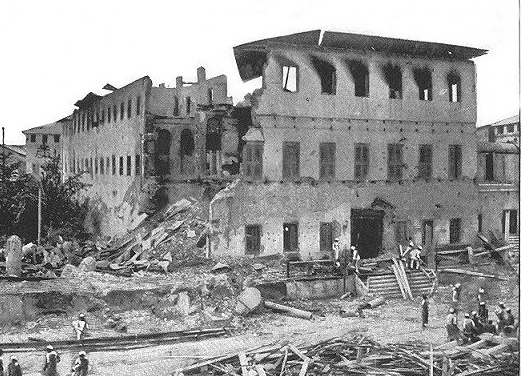Every high school and college student has heard of the Hundred Years’ War, even if very few of us recall the circumstances or combatants. Yet while long-lasting, it doesn’t compare to the length of other wars.
On the other extreme is the little-known Anglo-Zanzibar War of 1896. Essentially, it was a dispute over who got to determine who would lead the British protectorate East African island sultanate of Zanzibar. When the pro-British sultan died on August 25, 1896, his nephew, Prince Khalid bin Barghash, immediately declared himself sultan and moved into the palace. By the end of the day, he’d Khalid had secured the palace with almost 3,000 soldiers and supporters.
Great Britain was having none of this. It demanded Khalid surrender the throne to a cousin British diplomats intended to become sultan. The British already had two warships anchored in the harbor and another arrived that night. Two more warships arrived on August 26 and the British demanded Khalid leave the palace by 9 a.m. the following day.

Sultan’s palace after the bombardment
An hour before the deadline, Khalid refused. At precisely 9 a.m., the British warships opened fire. Within two minutes, the palace was on fire. The British ceased fire within 40 minutes, leaving 500 of Khalid’s fighters wounded or dead. Khalid supposed fled the palace as soon as the shooting started. The shortest war in history meant that Britain’s choice was the new sultan.
While that short war produced casualties, the longest recorded war was bloodless.
This war had its inception in the Second English Civil War. The war was fought between the Parliamentarians, led by Oliver Cromwell, and Royalist forces loyal to the Stuart monarchy. Cromwell’s victories and advances meant that by 1651, what remained of the Royalist Navy took safe harbor in the Isles of Scilly, an archipelago 25 miles off the southwestern tip of Cornwall, England. Given the success the Parliamentarians were having, the Dutch decided to ally with them. That led the Royalists to start raiding Dutch shipping lanes and Dutch merchant ships in the English Channel.

New York Times, April 18, 1986
The Netherlands demanded reparations for the losses — by sending 12 warships to blockade the Isles. Admiral Maarten Tromp of the Dutch Navy landed to demand the reparations. The Royal Navy refused, so on March 30, 1651, he declared war on the Isles. Three months later, the Royalists on the Isles of Scilly surrendered to Cromwell. With the blockade unnecessary, the Dutch warships returned home.
One may question whether an admiral has the power to declare war. Likewise, can you truly call a conflict war if there’s no shooting, battles, or bloodshed? Many would say not. But not the Netherlands. On April 17, 1986, its Ambassador to England helicoptered to the Isles of Scilly and declared an end to the war — 335 years after it began.
We know more about war than we know about peace, more about killing than we know about living.
Gen. Omar Bradley, Armistice Day Address, November 10, 1948







